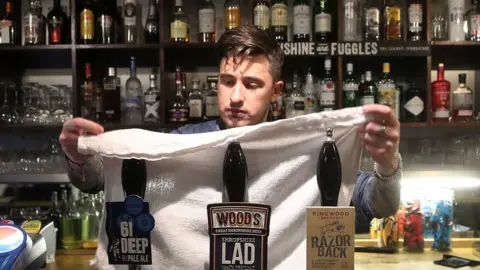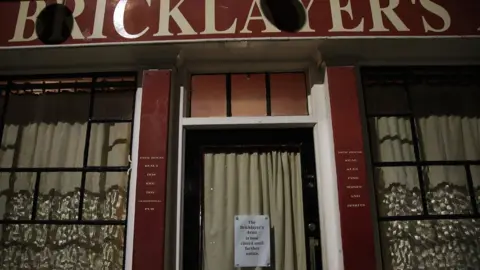Coronavirus: Self-employed need financial help, unions warn
Financial help is urgently needed for the five million self-employed workers hit by the coronavirus pandemic, trade unions and a former cabinet minister have urged.
Conservative MP David Davis said the economy could suffer a near "fatal seizure" if they were not protected.
But Treasury minister Stephen Barclay said it would be "operationally" hard to protect self-employed incomes.
He said the self-employed were being helped by measures such as the deferral of self-assessment tax requirements, payment holidays for mortgage payers and the strengthening of the welfare "safety net".
Frances O'Grady, general secretary of the Trades Union Congress, told the BBC's Today programme that the lack of measures put in place for the self-employed "will cause real hardship unless we get to grips with it".
The cinema workers' union Bectu said the measures were a "devastating blow" to its freelance and self-employed members and that workers needed "much more" support than was promised.

- A SIMPLE GUIDE: What are the symptoms?
- GETTING READY: How prepared is the UK?
- MAPS AND CHARTS: Visual guide to the outbreak
- PUBLIC TRANSPORT: What's the risk?

Chancellor Rishi Sunak, who announced the support package on Friday at the daily coronavirus briefing with the PM, said closing pubs and restaurants would have a "significant impact" on businesses.
But he added the government intervention - covering wages of up to £2,500 a month - would mean workers should be able to keep their jobs, even if their employer could not afford to pay them.
However, there was not the same wages guarantee for millions of self-employed people in the UK. Instead, Mr Sunak increased benefits that many will have to fall back on.
Mr Davis said it was vital the chancellor found a way of extending support to the self-employed.
"It is absolutely necessary. Without this the whole of the British economy will have a seizure - almost a fatal seizure in economic terms," he told the BBC.
"It is great for those who have got jobs but it does miss out a pretty important sector of the economy - namely the self-employed - and he (Mr Sunak) is going to have to find a way of replicating this for the self-employed as well."
It is understood the government's wage subsidy will apply to firms where bosses have already had to lay off workers due to the pandemic, as long as they are brought back into the workforce and instead granted a leave of absence.
The news was welcomed by UK business leaders who expressed "relief" after the government committed to pay the wages of employees unable to work due to the coronavirus pandemic.
'Landmark' offering
The Confederation of British Industry, the UK's biggest business group, said it was a "landmark" offering from the government.
"It marks the start of the UK's economic fightback - an unparalleled joint effort by enterprise and government to help our country emerge from this crisis with the minimum possible damage," director general Carolyn Fairbairn told BBC Newsnight.
Nik Antona, national chairman of the Campaign for Real Ale (Camra), said many pubs had been "hung in limbo" and welcomed the "clear instruction that closing their doors is the right thing to do" and gave owners confidence that the government would support their staff and their business.
 PA Media
PA MediaThe government had been under growing pressure to intervene to support workers to prevent mass unemployment as a result of measures directed against the outbreak.
But some business groups warned of the potential risk to firms if they had to wait for the money to arrive, with some businesses facing rent payments before the support is due.
The wage package is the latest in a series of government moves aimed at easing the burden on businesses and their employees.
Paul Johnson, director of the Institute for Fiscal Studies, said it was not yet clear how many people would take advantage of the government's offer, but he estimated that for every 1% of private sector workers who do, it will cost about £1bn.
"So if, for example, 10% of private sector workers do, it's £10bn over three months and if it's 20% then it's £20bn, or thereabouts," Mr Johnson told BBC 4's Today programme.
 Andrew Redington/Getty Images
Andrew Redington/Getty Images

This move is an incredible intervention for any British government, let alone a Conservative one, but proportionate to the size of the terrible, but temporary, economic impact that could follow the coronavirus shutdowns.
In theory, it should save hundreds of thousands of jobs. Perhaps more. Employers have to accept that the government is doing something they would have never imagined a UK government to do.
At 80% cent of wages up to £2,500 a month, it is a scheme more generous than some of the high welfare Scandinavian countries. It instantly transforms the social safety net of this nation.

 Warren Little/Getty Images
Warren Little/Getty ImagesThe new measures came as Prime Minister Boris Johnson said the closures of cafes, pubs and restaurants would be enforced "strictly" and that the situation would be reviewed each month.
He also announced that all the UK's nightclubs, theatres, cinemas, gyms and leisure centres had been told to close "as soon as they reasonably can".
"The more effectively we follow the advice we are given, the faster this country will stage both a medical and an economic recovery in full," the prime minister said.
It follows similar measures taken in other countries - including in Ireland, where pubs and bars were asked to close from last Sunday.
Meanwhile, the number of deaths in the UK rose to 177 on Friday - with 167 in England, six in Scotland, three in Wales and one in Northern Ireland.
